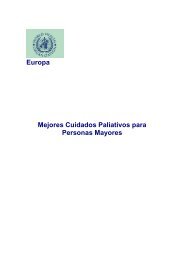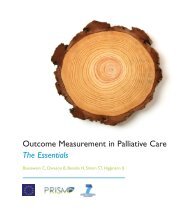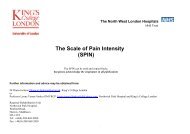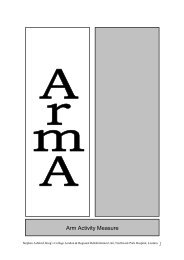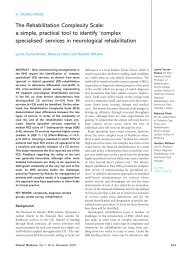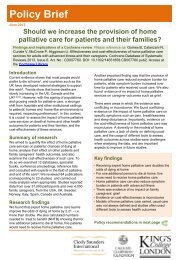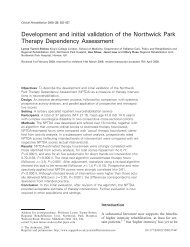2004 - 2007 - Cicely Saunders Institute - King's College London
2004 - 2007 - Cicely Saunders Institute - King's College London
2004 - 2007 - Cicely Saunders Institute - King's College London
You also want an ePaper? Increase the reach of your titles
YUMPU automatically turns print PDFs into web optimized ePapers that Google loves.
award enabled Richard Harding to attend Hospice Africa<br />
Uganda to teach nurses on the Distance Learning<br />
Diploma. The week-long module on research methods<br />
was very successful and attended by nurses from<br />
across East Africa.<br />
This year we have the first students from Africa<br />
attending our postgraduate education and we hope that<br />
this will continue to be a route to enhance research<br />
methods and other specialist knowledge that can be<br />
shared by attendees in their home countries.<br />
A particularly important development has been the<br />
appointments of the first palliative care research nurses<br />
in Africa, under a grant from the Big Lottery to <strong>Cicely</strong><br />
<strong>Saunders</strong> International and King’s <strong>College</strong> <strong>London</strong>. We<br />
have been able to offer these specialist staff protected<br />
contracts to focus on research and quality improvement,<br />
and they have produced high quality research data in a<br />
number of areas. This very enjoyable and successful<br />
partnership is an innovative model we hope to expand,<br />
and the opportunity to attend locally-delivered research<br />
training from KCL staff has been particularly appreciated<br />
by the nurses.<br />
King’s Centre for Palliative Neurology<br />
The King’s Centre for Palliative Care in Neurology<br />
(KCPN) is an exciting development that builds on<br />
internationally recognised clinical and academic<br />
expertise in neurology and palliative care at King’s<br />
<strong>College</strong> <strong>London</strong>. Nowhere have these two activities<br />
been thoroughly integrated, despite evidence that many<br />
patients with long term and progressive conditions<br />
benefit from integrated approaches to care. The KCPN<br />
and the component departments have wide-ranging<br />
collaborations, with many hospitals, hospices,<br />
community services – too numerous to list. In addition<br />
there are collaborative projects with researchers and<br />
educators in many academic institutions and national<br />
and international organisations. The Centre is led by<br />
Professor Irene Higginson and Professor Nigel Leigh as<br />
Co-Directors, assisted by an executive team comprising<br />
key partners from the departments of Neurology,<br />
Palliative Care, Policy and Rehabilitation, and from<br />
King’s <strong>College</strong> Hospital NHS trust. The Management<br />
Advisory Group comprises representatives of relevant<br />
user groups and of the wider academic, clinical,<br />
community and national partnership. In addition the<br />
Directors and Management group are advised by a<br />
Scientific Board to foster collaboration between<br />
research programmes and organisations. Current<br />
members on the Scientific Board include representation<br />
from the Motor Neurone Disease Association,<br />
Parkinson’s Disease Society, Multiple Sclerosis Society,<br />
Royal Hospital of Neurodisability and clinicians and<br />
academics from a variety of settings.<br />
A Consortium for Neuro-palliative<br />
Rehabilitation (NPR)<br />
People often think of rehabilitation as a short-term<br />
intervention to restore someone to independence after<br />
an accident or injury. However, in the context of neurodegenerative<br />
diseases, many people have profound and<br />
complex neurological disability (P&CND) and rehabilitation<br />
in this setting is focused on improving quality of life<br />
for patients and their carers, often against a backdrop of<br />
deteriorating physical, cognitive, communication and<br />
psychosocial function. It is a life-long process, which we<br />
have termed ‘neuropalliative rehabilitation’.<br />
A UK Consortium for Neuropalliative Rehabilitation has<br />
recently been established which has its principal<br />
academic base within the Centre for Palliative Neurology<br />
within King’s <strong>College</strong> <strong>London</strong>. The consortium brings<br />
together the three leading UK clinical centres for<br />
P&CND, covering a large catchment population in the<br />
south east quarter of England, and is led by:<br />
• Professor Lynne Turner-Stokes (NW <strong>London</strong> Regional<br />
Rehabilitation network),<br />
• Professor Keith Andrews (RHN Putney),<br />
• Professor Derick Wade (Oxford Centre for<br />
Enablement).<br />
The consortium already co-ordinates a <strong>London</strong> and SE<br />
England research group for collaborative and multicentre<br />
research into complex neurological disorders,<br />
and in collaboration with the British Society of Rehabilitation<br />
Medicine (BSRM), setting up a national network of<br />
rehabilitation units involved in research in this area. In<br />
addition to its UK membership, the consortium has<br />
collaborative links internationally with key researchers in<br />
the USA, Australia, New Zealand and the Netherlands.<br />
The purpose of the consortium is to undertake a coordinated<br />
health services research programme in<br />
Neuro-palliative Rehabilitation to address innovation and<br />
interventions to empower and support people with<br />
complex neurological disabilities following brain injury<br />
and other related long term neurological conditions.<br />
The programme supports evidence-based services<br />
which improve the quality of long-term care offered to<br />
patients and their families, in line with user demand and<br />
with Government policy which emphasises patient<br />
choice, user-centred interventions and outcomes,<br />
integrated multi-agency care, and long-term evaluation.<br />
7.2 Involvement in External Committees<br />
<strong>2004</strong>/5 – 2006/7<br />
Professor Irene Higginson<br />
Chair<br />
• MS Society Applied Research Panel<br />
Membership<br />
• Canadian <strong>Institute</strong>s for Health Research<br />
• Multiple Sclerosis Society Grant Review Panel<br />
• Dunhill Medical Trust Grants and Research<br />
Committee<br />
• National Cancer Research <strong>Institute</strong> Palliative Care<br />
Study Development Group (and Primary Palliative<br />
Care and Breathlessness subgroups)<br />
• Cancer Research UK Feasibility Committee<br />
• Macmillan Cancer Support Observatory Group<br />
• Motor Neurone Disease Association Clinical<br />
Advisory Group<br />
• Guy’s and St Thomas’ Charitable Foundation Service<br />
Innovations and Development Group<br />
• Association for Palliative Medicine Science<br />
Committee<br />
• General Medical Council Guidance on Withholding<br />
and Withdrawing Treatment<br />
34




